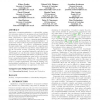Free Online Productivity Tools
i2Speak
i2Symbol
i2OCR
iTex2Img
iWeb2Print
iWeb2Shot
i2Type
iPdf2Split
iPdf2Merge
i2Bopomofo
i2Arabic
i2Style
i2Image
i2PDF
iLatex2Rtf
Sci2ools
CCS
2015
ACM
2015
ACM
Clean Application Compartmentalization with SOAAP
Application compartmentalization, a vulnerability mitigation technique employed in programs such as OpenSSH and the Chromium web browser, decomposes software into isolated components to limit privileges leaked or otherwise available to attackers. However, compartmentalizing applications – and maintaining that compartmentalization – is hindered by ad hoc methodologies and significantly increased programming effort. In practice, programmers stumble through (rather than overtly reason about) compartmentalization spaces of possible decompositions, unknowingly trading off correctness, security, complexity, and performance. We present a new conceptual framework embodied in an LLVM-based tool: the Security-Oriented Analysis of Application Programs (SOAAP) that allows programmers to reason about compartmentalization using source-code annotations (compartmentalization hypotheses). We demonstrate considerable benefit when creating new compartmentalizations for complex applications, and ...
| Added | 17 Apr 2016 |
| Updated | 17 Apr 2016 |
| Type | Journal |
| Year | 2015 |
| Where | CCS |
| Authors | Khilan Gudka, Robert N. M. Watson, Jonathan Anderson, David Chisnall, Brooks Davis, Ben Laurie, Ilias Marinos, Peter G. Neumann, Alex Richardson |
Comments (0)

